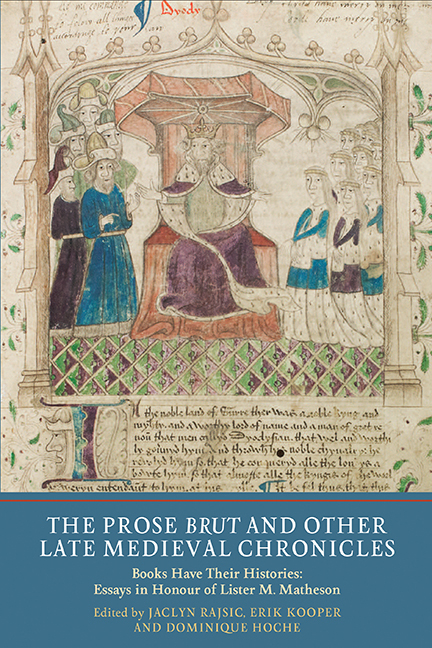 The Prose Brut and Other Late Medieval Chronicles
The Prose Brut and Other Late Medieval Chronicles Book contents
- Frontmatter
- Dedication
- Contents
- List of Plates
- List of Contributors
- Acknowledgements
- Curriculum Vitae of Lister M. Matheson
- Introduction
- A Memoir: The Whole Haggis: Lessons From the Work of Lister M. Matheson
- Part I Uses of History
- Part II The Prose Brut
- Part III Receptions and Afterlives of Late Medieval Chronicles
- 9 Trevet's Les Cronicles: Manuscripts, Owners and Readers
- 10 Matthew Parker and the Middle English Prose Brut
- 11 Thomas Hearne and English Chronicles
- 12 The Manuscript of Castleford's Chronicle: Its History and its Scribes
- 13 Bruts for Sale
- Index of Manuscripts Cited
- General Index
- Tabula in Memoriam
9 - Trevet's Les Cronicles: Manuscripts, Owners and Readers
from Part III - Receptions and Afterlives of Late Medieval Chronicles
Published online by Cambridge University Press: 05 July 2016
- Frontmatter
- Dedication
- Contents
- List of Plates
- List of Contributors
- Acknowledgements
- Curriculum Vitae of Lister M. Matheson
- Introduction
- A Memoir: The Whole Haggis: Lessons From the Work of Lister M. Matheson
- Part I Uses of History
- Part II The Prose Brut
- Part III Receptions and Afterlives of Late Medieval Chronicles
- 9 Trevet's Les Cronicles: Manuscripts, Owners and Readers
- 10 Matthew Parker and the Middle English Prose Brut
- 11 Thomas Hearne and English Chronicles
- 12 The Manuscript of Castleford's Chronicle: Its History and its Scribes
- 13 Bruts for Sale
- Index of Manuscripts Cited
- General Index
- Tabula in Memoriam
Summary
EARLY fourteenth century England witnessed a resurgence of interest in Anglo- Norman historiographical texts, the likes of which had not been seen since the period following the accession of Henry II in the second half of the twelfth century. During the reigns of the first three Edwards, multiple texts narrating the history of the kings of England were written in Anglo-Norman: the Prose Brut, the Livere de Reis de Britannie, the Anonimalle Chronicle, the Livere de Reis de Engleterre, the Brute, the Lignee des Bretons et des Engleis and the Petit Brut. More recent scholarship has shown an interest in the reception of these types of works, as the great number of manuscripts with Anglo-Norman prose chronicles suggests they were quite popular during the fourteenth and fifteenth centuries. Ownership and readership of Anglo-Norman prose chronicles in the fourteenth century was varied; as John Spence notes:
the chronicles were widely read by members of the nobility, the gentry and the clergy – especially men, though some works were also written for women. The evidence from surviving copies suggests that these works were most popular in certain areas of the country: in south-east England, especially at some large monasteries; in the north of England, with a focus on English claims in Scotland; and also in the March of Wales, with a focus on Marcher lords. Judging by material preserved alongside the Anglo-Norman prose chronicles, they were primarily seen as serious historical writing and frequently circulated with complementary historical texts in Latin and Anglo-Norman.
The writing of these vernacular national chronicles preceded the composition of Anglo-Norman works that attempted to be more universal in nature, incorporating the foundation myth and lineage of British and English kings into the framework of biblical history and the history of Rome. One of the first to successfully accomplish the writing of such a universal chronicle in Anglo-Norman was Nicholas Trevet in his work known as Les Cronicles.
- Type
- Chapter
- Information
- The Prose Brut and Other Late Medieval ChroniclesBooks have their Histories. Essays in Honour of Lister M. Matheson, pp. 149 - 164Publisher: Boydell & BrewerPrint publication year: 2016
